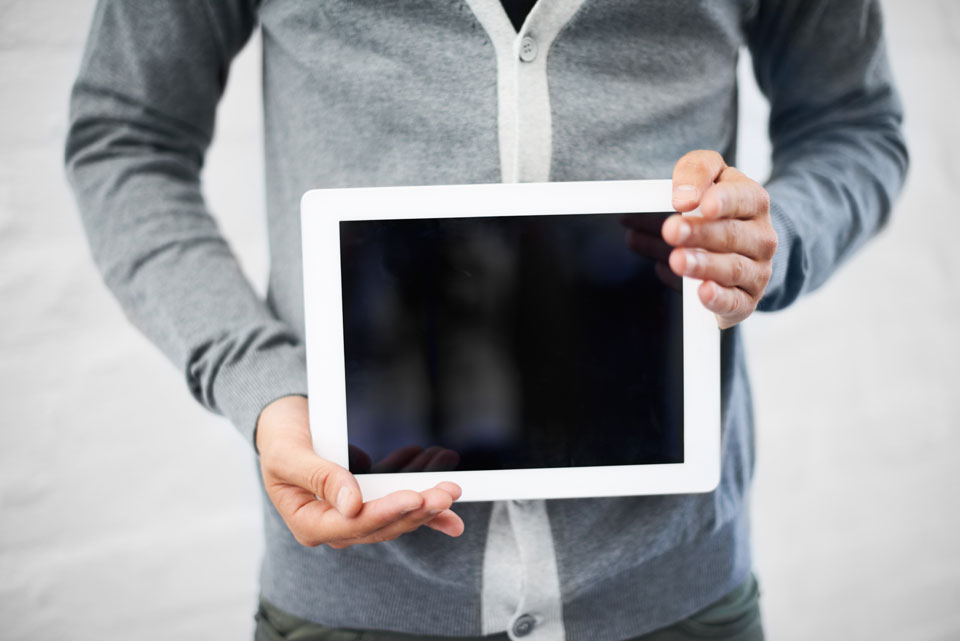One of the first decisions you need to make when purchasing a new tablet is which operating system (OS) you want to run. Choose from:
- Apple's iOS with its ever growing library of applications
- Google's Android OS, found on many different manufacturers' devices
- Microsoft's Windows, which runs tablet apps and all your current Windows programs
Here are the results of a 2014 PCMAG survey asking people to rate their satisfaction with a variety of operating systems (0 — extremely dissatisfied, 10 — extremely satisfied).
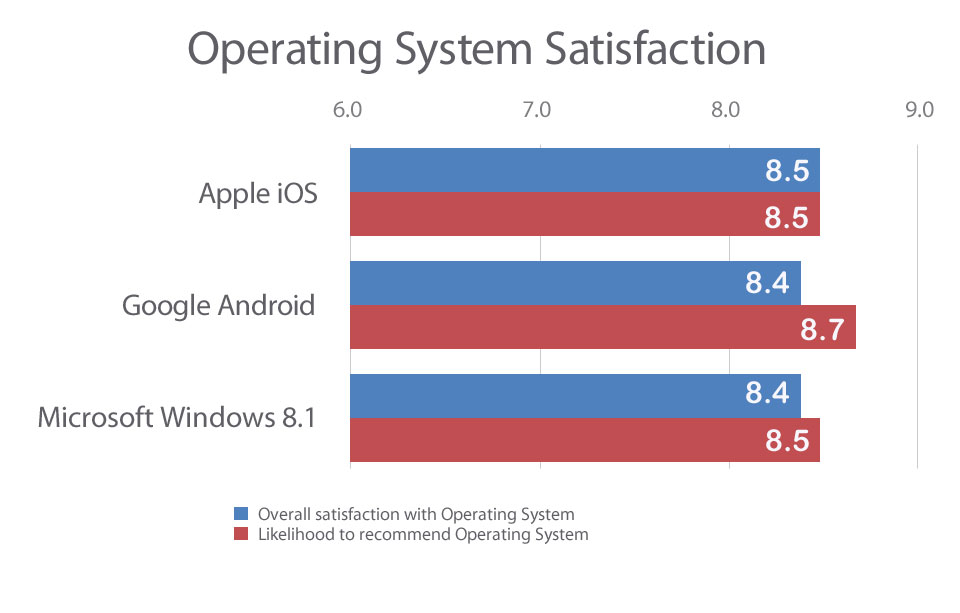
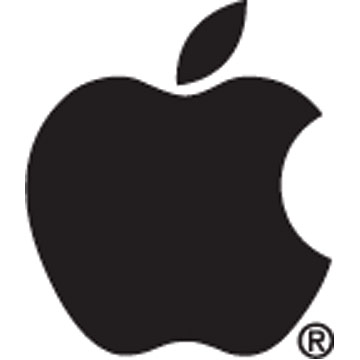
iPad Strengths
- Number of apps – the App Store now has more than 1.2 million apps, with 475,000 designed specifically for the iPad and the rest capable of running in compatibility modes.
- Stability and ease of use – Apple approves each app individually, ensuring that it does what it claims it will do. And because Apple and app developers only need to support a limited number of Apple devices, it is easier to stamp out bugs.
iPad Weaknesses
- Less customization and ability to expand. The iPad lacks the ability to expand its storage through microSD cards and flash drives.
- Price – With 7-inch tablets becoming more popular, you'll pay $329 for the iPad Mini, which is far more than you'll pay for a current generation Android tablet which costs just $199.
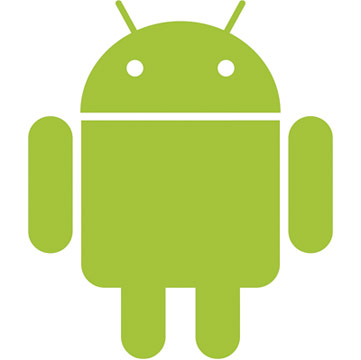
Android Strengths
- A vast array of tablet choices and the ability to customize your purchase. Google Nexus, Samsung Galaxy and Asus are three of the premier Android tablets, but there are also hundreds of other lesser-known brands.
- Expanding app assortment. Android's Google Play marketplace now hosts over 1.3m apps.
- Lower price. In many cases, however, you get what you pay for – a $79 tablet might look attractive at first, but it could have a slower processor and poorer screen quality.
Android Weaknesses
- Lack of supervision over Google Play – You know exactly what you are getting when you download name-brand apps like Netflix or Hulu Plus, but when you see some little-known app, you don't quite know what you are going to get and if its 100% compatible with your specific device.
- Lack of support – Android operating system updates are not always compatible with all devices, and it can be difficult for app developers to stamp out bugs on all supported devices.
- Lower price. In many cases, however, you get what you pay for – a $79 tablet might look attractive at first, but it could have a slower processor and poorer screen quality.
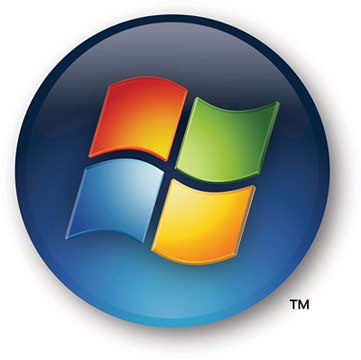
Windows Strengths
- Windows tablets are, in fact, full PCs with a touch interface. Most can do anything that their bigger siblings can do, and you can plug in peripherals including keyboards, mice, external hard drives and DVD drives.
- You can do real work on a Windows tablet. Because these tablets are full PCs, a properly equipped Windows tablet can handle all the tasks you do on your laptop or desktop.
Windows Weaknesses
- Limited selection of tablet optimized apps – major tablet apps such as Youtube are still missing from the Windows store.
- Price – Windows tablets are priced all over the board depending on the specs, however, the more productive 9"+ sizes will always be more expensive than Android. (Windows requires a licensing fee for using their operating system with screens larger than 9").
- Steeper learning curve – There are hidden menus and toggles based upon your finder motion on the screen, and the desktop is more difficult to navigate in touch mode than other operating systems.
iPad: Who Should Buy?
The iPad is a great tablet for those who want to take the experience beyond just media consumption – with the right apps it can also be used to make movies, create music and write books.
The iPad is also the perfect tablet for those who are a little intimidated by technology. Apple has decided to go with a simpler design, which may mean less customization, but also means it's easier to use.
Finally, the iPad makes a great companion to those who already own other Apple products. iPhone users will enjoy Photo Stream, which lets you share photos between devices, and Apple TV owners will love the ability to wirelessly send the iPad's display to their big screen TV.
Android: Who Should Buy?
The Android audience can be divided into two main categories: (1) those who want to use the device for watching movies, reading books, listening to music and playing games and (2) those who want to customize their experience or love to tweak their device to get the most out of it.
Android tablets will appeal to those who mostly want to consume entertainment because the initial price tag can be significantly cheaper. This means more money for the good stuff, and the cheaper 7-inch tablets like the Samsung Tab 7 and Kindle Fire are more than capable of running Netflix, Hulu Plus, playing music and reading books.
Android also provides a more customizable experience. So if the first thing you do when you get a new smartphone or gadget is to hit the settings to get it just right, you might be the perfect Android user. Home screen widgets might intimidate some people, but they can be both useful and pretty cool. Also, as Android is more open than iPad you will be able to perform certain tasks and have access to settings that are not available on iPad.
And just as the iPad can interact with other Apple devices, Android tablets can be a great companion to those who already own an Android smartphone.
Windows: Who Should Buy?
Windows shines above all for those who want to create and get work done. While it can be great for consuming media, the ability to seamlessly go from working in an Excel spreadsheet, playing Grand Theft Auto, then being able to sit back and watch the latest show on Netflix is truly what makes Windows unique.
The lack of touch enabled apps will dissipate over time as Windows tablets begin to mature. Windows 10 apps that are created for the tablet will also work on Windows phone as well as the Xbox. In the meantime all legacy apps and websites will still work in the browser.
Credits:
- //www.pcmag.com/article2/0%2c2817%2c2457981%2c00.asp
- //ipad.about.com/od/ipad_competition/tp/iPad-vs-Android-Which-Tablet-Should-You-Buy.htm
- //www.zdnet.com/pictures/10-reasons-to-buy-a-windows-tablet-instead-of-the-ipad-or-android/11/
- //www.statista.com/statistics/276623/number-of-apps-available-in-leading-app-stores/
- //techcrunch.com/2014/06/02/itunes-app-store-now-has-1-2-million-apps-has-seen-75-billion-downloads-to-date/
